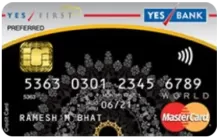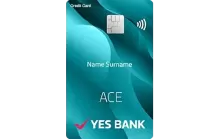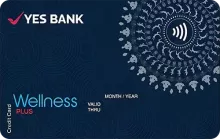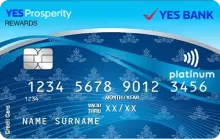YES Bank BYOC Credit Card
YES Bank has recently introduced a customizable credit card called the YES Bank BYOC Credit Card, where BYOC stands for 'Build Your Own Card.' It has a monthly fee of Rs. 49, and you may need to pay a one-time charge if you wish to customize the card’s material. You can choose from three options: a metal card, an eco-friendly card, or the regular plastic version. Additionally, you can select a rewards plan based on your spending habits and preferences.
This card competes directly with the AU Small Finance Bank's recently launched AU Bank LIT Credit Card. The YES Bank BYOC Credit Card not only offers great rewards but also provides various perks in categories like travel and golf. For more detailed information on the card, its features, and fees, continue reading the article.
Rewards and Benefits
Fees & Charges
What should you consider before applying for a credit card in India?
Before applying for a credit card in India, consider the following factors:
- Eligibility Criteria: Check the age, income, credit score, and employment status requirements set by the bank or financial institution.
- Credit Score: A higher credit score increases your chances of approval and may result in better offers. Ensure your credit score is in good standing.
- Interest Rates and Fees: Compare annual percentage rates (APR), processing fees, late payment penalties, and foreign transaction fees. These can vary significantly between cards.
- Rewards and Benefits: Look for cards that offer rewards, cashback, discounts, or other perks that align with your spending habits.
- Credit Limit: Make sure the credit limit offered is in line with your financial needs. Avoid over-borrowing, which can lead to high-interest charges.
- Repayment Terms: Understand the repayment options, minimum payment amount, and due dates. Consider how easily you can manage timely payments to avoid interest accumulation.
- Card Type and Features: Choose a card type (e.g., standard, premium, travel, etc.) based on your requirements. Some cards offer more benefits for specific categories like travel, shopping, or dining.
- Bank’s Reputation: Opt for a bank with a good track record of customer service and transparency. Read reviews and consider their customer support accessibility.
- Hidden Charges: Be aware of any hidden fees, such as annual fees, balance transfer charges, and cash withdrawal fees.
- Credit Utilization: Ensure you can manage your spending within the credit limit to maintain a healthy credit utilization ratio, which impacts your credit score.
- Long-Term Financial Plans: Think about how the credit card will fit into your long-term financial goals and avoid accumulating unnecessary debt.
Is there a limit on how many Reward Points I can earn with the BYOC Reward variant?
No, you can earn unlimited reward points on all purchases (except fuel), with 8 points for every Rs.200 spent.
What makes the YES Bank BYOC Credit Card different from other cards?
You can customize your YES Bank BYOC Credit Card, including choosing the material, image on the card, businesses for cashback, and the rewards or cashback it gives.
How do I apply for the YES Bank BYOC Credit Card?
You can apply on the YES Bank website.
Can I contact YES Bank to change my YES Bank BYOC Credit Card plan?
No, you can only change your plan by yourself using the YES Mobile App or the YES Service portal.
Can I switch my benefit from reward to cashback, or vice versa, after getting the card?
No, once you get the card, you can't change the core benefit between reward and cashback.





Leave a Reply